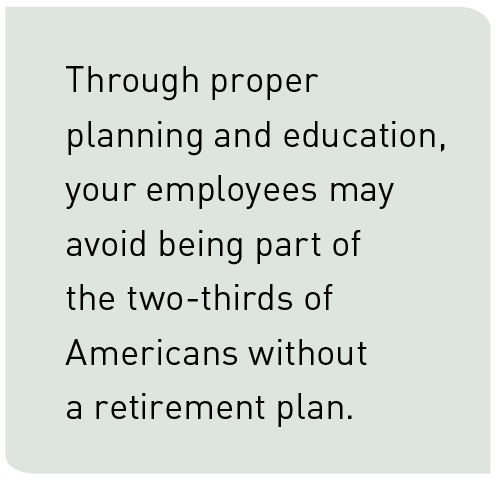HOME | ABOUT US | MEDIA KIT | CONTACT US | INQUIRE
HOME | ABOUT US | MEDIA KIT | CONTACT US | INQUIRE

Recently, a financial expert surmised that one in three Americans currently does not have any type of retirement plan. With this potential crisis at hand, leaders must not only have strong financial plans for their business but also position their employees so they avoid this phenomenon; all the while supporting their own retirement and financial planning goals. There are many key initiatives that you, as a business owner or executive, can employ to help support your employees’ and their future.
1. Compensation with a Focus on Long-Term Financial Planning. More often than not, business owners and executives believe employees are more focused on the here and now, not the future. This is a common mistake. With diligent research and guidance, you can create a fair and equitable compensation program focusing on the long-term as well as the immediate need. If you’re not a financial planning expert, look to partner with a trusted adviser who can help your employees navigate the sometimes confusing and stormy seas of financial and retirement planning. If employees see it as important to you, it will become important to them. 2. Leadership Development. The development of your employees’ leadership skills, and yours, will affect your business and your team members’ lives. When employees feel valued and that you are investing time and assets into their career growth, they are more likely to remain with your company and make it a destination, not just a stop along the way. This will increase your opportunity to eliminate unnecessary employee turnover and associated costs. Turnover is estimated to cost
2. Leadership Development. The development of your employees’ leadership skills, and yours, will affect your business and your team members’ lives. When employees feel valued and that you are investing time and assets into their career growth, they are more likely to remain with your company and make it a destination, not just a stop along the way. This will increase your opportunity to eliminate unnecessary employee turnover and associated costs. Turnover is estimated to cost
as much as 140 percent of the lost employee’s annual salary—take that 40 percent difference and invest it in yourself and your own retirement plan!
3. Staying the Course. Having self-discipline is a key. Employees look to you, the owner or executive, as the behavioral barometer of what is acceptable. Having self-discipline can take many forms; from sticking to a business plan, maintaining a budget, properly handling cash ebbs and flows and sticking to your own retirement plan are just a few. An entrepreneur or executive must understand that all eyes are on them and that if they are un-disciplined, they have now set the standard for employees, not just when making decisions affecting the business, but also in their own retirement planning strategies. “If their boss isn’t saving, why should I? There must be a good reason, right?”
4. Change Management and Contingency Planning. While self-discipline is paramount to financial success, so are change management and contingency planning. Seemingly polar opposite in theory, they actually should be melded together to create an atmosphere of nimbleness and preparedness for handling adverse situations. This strategy is valuable to both your business and your employees’ respective to the importance of analyzing potential problems before they happen. The financial landscape is constantly evolving and by exampling forethought, change management knowledge and the ability to change quickly, your employees will be well
prepared to handle adversity.
5. Setting Goals and Monitoring Progress. Having a plan, being educated and expertly advised and prepared for change are all great. But in order to leverage the best possible outcomes, you must have goals and regularly monitor their progress. Just like with your business, you must have personal retirement and financial goals. Once these goals are set and are deemed realistic, set timely benchmarks to monitor progress. This radiates to business initiatives, company goals and helping employees analyze their financial planning goals. If employees (or you for that matter) do not measure progress versus the goals, how will anyone know when change and contingency plans need to be executed? How will they know when it’s time to sit down and talk to you as their leader about ways to improve their situation?
The Bottom Line. You have a significant influence on your employees’ financial future and retirement planning success. You are the example. Through proper planning and education, your employees may avoid being part of the two-thirds of Americans without a retirement plan. This focus will have a life-changing impact on their futures and you will have put your mark on the financial success for them, their family and their heirs.
Retirement Solutions Group and RSG Investments assist retirees and pre-retirees in the creation of retirement strategies that may include the use of insurance and investment products. Investment advisory services offered through Global Financial Private Capital, LLC, an SEC Registered Investment Advisor. Only Alan Becker of RSG Investments, Inc. is licensed to give investment advice. Retirement Solutions Group and RSG Investments are not affiliated with the U.S. government or any governmental agency